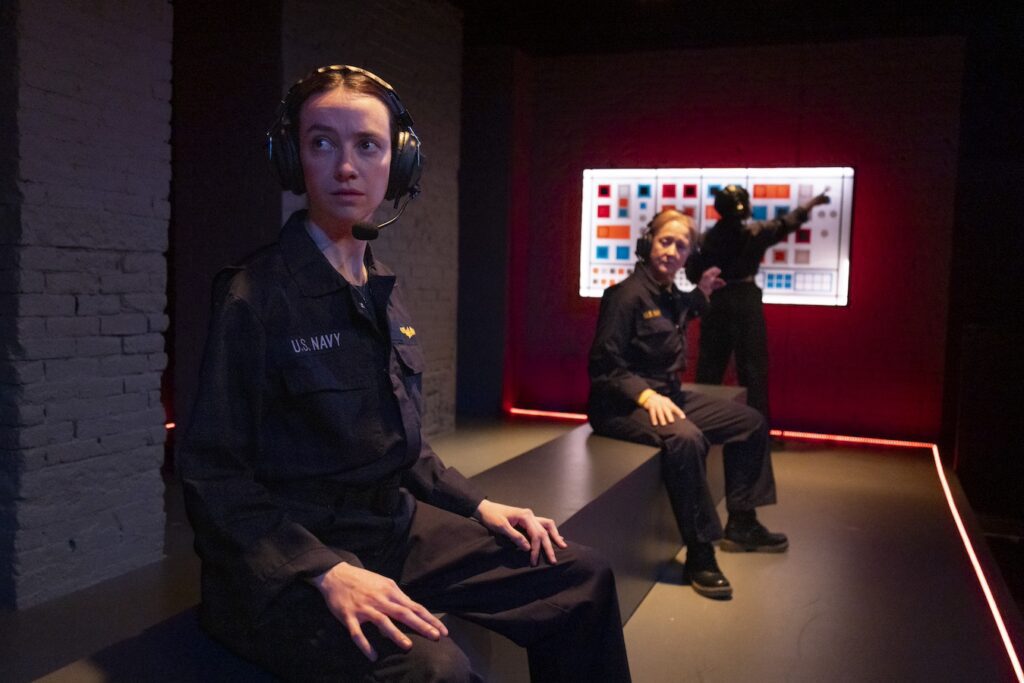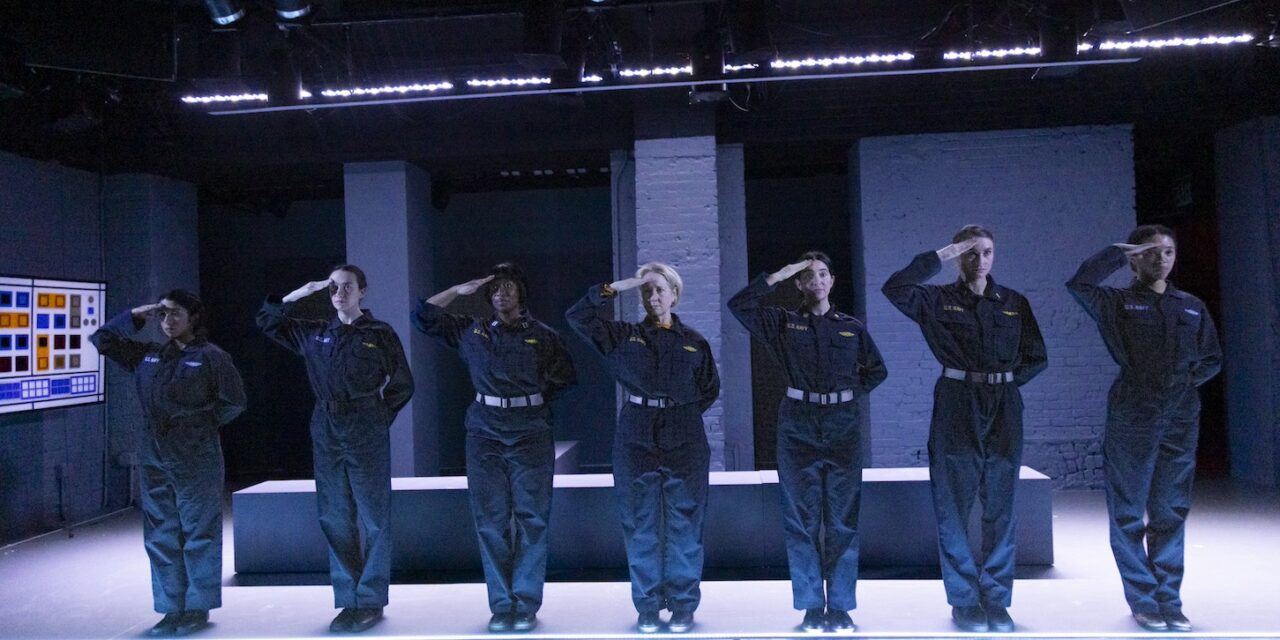Theater Review by Stuart Miller . . . .
Five years ago I saw Cayenne Douglass’ one-act play, Oh My, Goodness, about suicide and survival, at the Ensemble Studio Theater and was moved by her nuanced writing of complicated and messy people striving for hope. (Her work was aided by excellent performances from Zach Grenier and Margot White under the direction of Billy Carden.)
So I was very excited to finally see Douglass’ first full-length play, Maiden Voyage—about an all-female submarine crew and a captain who loses her way—but that only deepened my disappointment in this sinking vessel. Maiden Voyage, with a cast of seven, visual projections, and plenty of sound effects, is a bold attempt—a big shift from her quiet two-hander—but it’s a misguided one that steers away from the strengths I know she has.

The play features a cast of seven, none of whom are particularly well-developed: the captain (Brenda Crawley) is so determined that this pioneering mission succeed that she makes several terrible, dangerous decisions; but there’s not much more to her than that. Ace (Rachel Greisenger) is an experienced submariner who had a brother who committed suicide—but beyond that, nothing leaps out. Dot Com (Natasha Hakata) is similarly nondescript. Sledge (Kait Hickey) is a bully and something of a sexual predator. She’s also a two-dimensional caricature, as is Twinkle Toes (Georgia Kate Cohen), the hyper-religious woman who represses her queer nature and sucks up to the captain. The two newest submariners Esmerelda (Shimali De Silva) and Scooby (Arianne Banda) are the most sharply drawn, and their characters might have saved the day if they were the focal point, but the play’s focus is too diffuse.
Exacerbating the problem is that director Alex Keegan does nothing to rein in the actors who play too broadly as if they’re in a much larger house than the tiny Flea Theater. Much of the cast struggles, both with the submarine technical jargon and the more personal dialogue. Crawley frequently rushes through or swallows lines, while Hickey and Cohen overact, calling attention to the lack of details in their characters.


The exception is Banda, who gives Scooby some real depth, whether she’s flirting with or resisting Sledge; she’s particularly poignant in the scene when she tries to control her rage and disappointment after she reports being raped to the captain, only to see how desperate her commander is to sweep the incident under the rug. Scenes like that offer flashes of Douglass’ talent in creating believable and powerful moments that tackle serious issues in a humane way, but there are too few of them in this script.
Instead, the show is plagued by inconsistencies and sloppy writing. Twinkle Toes is one victim of a rookie hazing, practical joke . . . but later we learn this is her fourth time under the sea.
During a card game, the death of a Navy Seal prompts a heated debate about whether it was suicide. (We have no idea who this character is—he’s just dropped into the conversation.) Twinkle Toes infuriates Ace by saying that if it was suicide he cannot be forgiven by God. When Ace storms off, Dot Com inexplicably chastises her not for the content of what she said but for upsetting a superior (Side note: even the card game is botched—why would grown women play Go Fish, and if they did, why would one player hand over a pair of nines to an opponent, when she should have laid those down herself?)


Moments later, Ace confesses to Esmerelda that her brother, “the most extraordinary human you could ever hope to meet,” killed himself and that she has trouble dealing with it. When Esmerelda encourages Ace to recall three good things about her brother it feels like another strong moment coming; but, instead, the scene ends there and cuts to two other characters, coming back only when Ace has finished and is saying “That was nice,” which is so utterly lacking in genuine detail it symbolizes the play’s flaws.
During the play, my mind wandered to the idea that If Maiden Voyage were a star-studded 1970s disaster film like Towering Inferno or The Poseidon Adventure, then maybe the realistic action scenes and special effects, combined with scenes full of secondary actors and a sterling cast—say, Viola Davis as the captain—could overcome the lackluster script and generate enough excitement while touching on some important issues. But that isn’t happening any time soon. So, hopefully, instead, Douglass will return to writing smaller, more intimate plays like Oh My, Goodness.
Maiden Voyage. Through March 17 at the Flea Theater (20 Thomas Street, between Broadway and Church Streets). Run time is approximately 2 hours 20 minutes, plus a ten-minute intermission. www.theflea.org
Photos: Bronwen Sharp


















